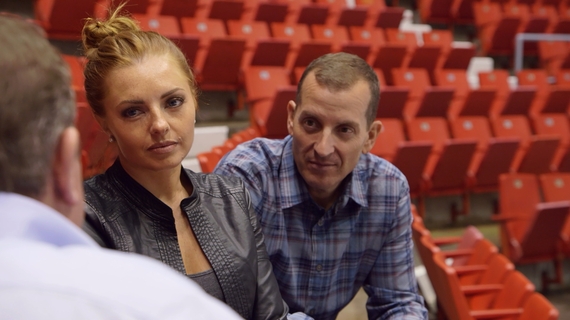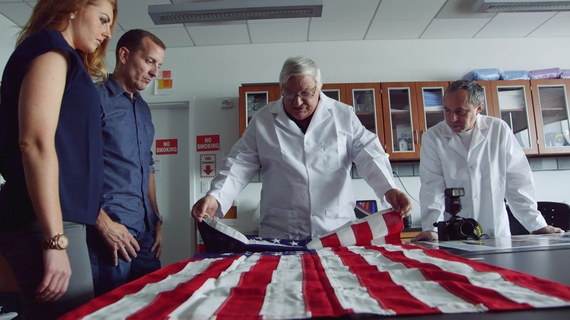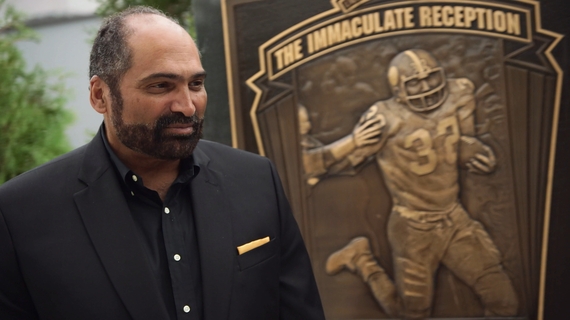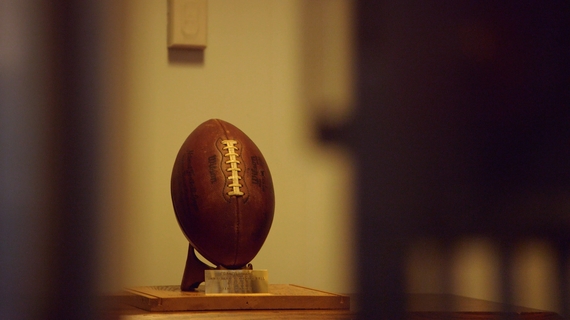Once upon a time, sports memorabilia was a fun little incidental sideline for kids. Your favorite player signed a baseball. Cool!
These days, sports memorabilia sometimes feels like it's a bigger American industry than automobile production.
And so we get a TV series like Sports Detectives, which premieres Sunday at 9 p.m. ET on Smithsonian.
The premise sounds fairly simple: Sports reporter Lauren Gardner and private investigator Kevin Barrows (above) team up to track down iconic sports memorabilia whose trail grew vague after its moment in the spotlight.
Sample items: the flag that was draped over Jim Craig's shoulders after the U.S. team clinched the "Miracle on Ice" Olympic hockey gold medal in 1980; the football that the Pittsburgh Steelers's Franco Harris caught and turned into the Immaculate Reception of 1972; the boxing gold medal won by Muhammad Ali, then Cassius Clay, at the 1960 Olympics; the ball used in the 1962 NBA game where Wilt Chamberlain scored 100 points.
You don't have to be a hard-core sports fan to be aware of those moments, and you don't have to be a hard-core memorabilia collector to realize someone would pay a lot of money for those items.
Unfortunately, the money part sometimes feels a little too prominent here. That's not the fault of the producers or the reporters. They didn't create this crazy market. But viewers may get the feeling that perceived value, rather than sports significance, could lie behind some of these features.
That kvetch aside, sports fans can't help enjoying the stories and the minidramas here.
In the case of Craig's flag, which is the Sunday night kickoff episode, we hear dueling stories.
One is that Peter Cappucilli Jr., the fan who draped it over Craig's shoulders in Lake Placid, took it back after the Olympic medal ceremony, kept it for 18 years, then gave it to Craig.
The other is that Craig gave it to his Olympic friend and fellow goalie Pelle Lindbergh, who took it back to Sweden.
Cappucilli and the fiancé of the late Lindbergh both recount their stories, and the Detectives team sorts it out.
The Harris ball story seems more straightforward. A Steelers fan named Jim Baker has said for 44 years that he ran onto the field and grabbed it after Steelers's kicker Roy Gerala booted the game's concluding (and superfluous) extra point.
No one says otherwise. But the Detectives note that there was a 15-minute gap between Harris scoring the winning touchdown and the extra point being kicked.
So to substantiate Baker's story, they have to rule out the possibility that during those chaotic minutes, one of the referees brought in another ball.
The Detectives talk to Harris (above), among other people, and the potential problem is obvious. No one was paying any attention to the ball, which wasn't exactly the big story of the moment.
Using game footage, stills and the memories of the Steelers's equipment manager, they analyze Baker's story.
Some of the stories get less feel-good and more uncomfortable. The fate of Cleveland Browns running back Jim Brown's only championship ring, for instance, gets mired in shadowy stories of burglary, divorce and potential counterfeiting.
But whatever the outcome, Sports Detectives evokes some great moments, and sports fans can rarely get enough of that.
It should be noted that the show apparently doesn't have an unlimited licensing budget, so there's no footage from the 1980 Olympic hockey victory, just still photos. That particular episode also sometimes feels like it's padded a little to fill the hour.
In the end, Gardner and Barrows both make their larger point, which is that back in the olden days, sports memorabilia was conducted on the basis of trust and good will.
These days, with so much more at stake, the name of the game is provenance. Evidence. Proof. As another old sports guy named Leo Durocher is reported to have said, "You trust your mother, but you cut the cards."




